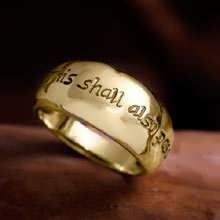
Der Ring der Veränderung Gold
Eingraviert mit dem Satz - Das wird auch vergehen
Erinnere den Träger daran, dass Veränderungen die Natur aller Dinge sind
The Ring of change
This is another version of the Happiness ring inscribed in English instead of Hebrew. The ring of Happiness is tied with a story that originated in Buddhism. The tale is about two brothers who lived in their father's mansion. The father was a wealthy man and when his time came, both his sons inherited his fortune.
The sons divided the estate equally between them. After the division, the younger of the two brothers found a small bag in a closet, in it were two rings. One ring was a precious gold ring embedded with a diamond; the other was a simple silver ring. When the young brother showed the rings to his elder, the elder said that since he was the first to be born he should have the more valuable ring. The younger brother agreed and so it was. When the younger brother reached his home he saw that there was an inscription on his silver ring, it stated: "This too shall change". The time of the year was spring and the brothers were with high spirits. The following summer also brought with it joyous moments to both brothers. As autumn set in, the elder brother slipped into melancholy.
The younger brother also felt a certain measure of sadness, but as he looked upon his father's ring he remembered that these times shall change and his feelings improved. During the winter when the sun was reluctant to show its face, the older brother was depressed while the younger brother knew that this too shall change. The years went by, the elder brother was melancholic who's life was full of sorrow. The younger brother lived his life peacefully and joyously with his family.
Reality is in a constant state of change. When one is a believer and clings to things without realizing that this too will change and pass, he is destined to feel the sorrows of severance. This sorrow will continue until this person realizes that all things are transient.
The ring is inscribed in English – This shall also pass